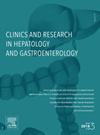幽门螺杆菌感染的药物治疗进展及未来展望:利用人工智能。
IF 2.4
4区 医学
Q2 GASTROENTEROLOGY & HEPATOLOGY
Clinics and research in hepatology and gastroenterology
Pub Date : 2025-09-19
DOI:10.1016/j.clinre.2025.102689
引用次数: 0
摘要
幽门螺杆菌仍然是胃炎的主要原因。世界范围内抗生素耐药性的上升破坏了传统疗法,导致标准克拉霉素三联疗法的减少,需要新的治疗策略。在这篇综述中,我们总结了幽门螺杆菌药物治疗的进展,包括使用新的药物(如钾竞争酸阻滞剂vonoprazan和含有利法布汀的方案),优化方案(如10-14天的铋四联疗法)和辅助方法(益生菌)。我们强调了特定区域的挑战,例如幽门螺杆菌患病率高且资源有限的发展中国家,在这些国家,标准疗法的根除率可能极低。我们还讨论了个性化方法,包括抗生素敏感性测试,局部耐药性监测,甚至人工智能(AI)驱动的决策工具,如何指导方案选择(三重、四重、挽救)以最大限度地提高成功率。成本方面的考虑也得到了解决,注意到昂贵的治疗可能会限制它们的使用,特别是在资源匮乏的环境中。最后,我们概述了未来的发展方向,如将人工智能整合到临床支持系统和扩大诊断可及性,以改善幽门螺杆菌管理,患者依从性,最大限度地提高治疗效果,最大限度地减少抗生素滥用,并提高全球根除成功率。本文章由计算机程序翻译,如有差异,请以英文原文为准。
Advances and future perspectives in the pharmacological treatment of Helicobacter pylori infection: Taking advantage from artificial intelligence
Helicobacter pylori remains a major cause of gastritis. Rising antibiotic resistance worldwide has undermined traditional therapies, leading to the decline of standard clarithromycin-based triple therapy, necessitating new treatment strategies. In this review, we summarize advances in H. pylori pharmacotherapy, including the use of novel agents (e.g., the potassium-competitive acid blocker vonoprazan and rifabutin-containing regimens), optimized regimens (such as 10–14 day bismuth quadruple therapy), and adjunctive approaches (probiotics). We highlight region-specific challenges, such as developing countries with high H. pylori prevalence and limited resources, where eradication rates with standard therapies can be extremely low. We also discuss how personalized approaches, including antibiotic susceptibility testing, local resistance surveillance, and even artificial intelligence (AI)-driven decision tools, can guide regimen choice (triple vs. quadruple vs. salvage) to maximize success. Cost considerations are also addressed, noting that expensive treatments, may limit their use especially in low-resource settings. Finally, we outline future directions, such as integrating AI into clinical support systems and expanding access to diagnostics, to improve H. pylori management, patient adherence, maximize treatment efficacy, minimize antimicrobial misuse, and improve global eradication success rates.
求助全文
通过发布文献求助,成功后即可免费获取论文全文。
去求助
来源期刊

Clinics and research in hepatology and gastroenterology
GASTROENTEROLOGY & HEPATOLOGY-
CiteScore
4.30
自引率
3.70%
发文量
198
审稿时长
42 days
期刊介绍:
Clinics and Research in Hepatology and Gastroenterology publishes high-quality original research papers in the field of hepatology and gastroenterology. The editors put the accent on rapid communication of new research and clinical developments and so called "hot topic" issues. Following a clear Editorial line, besides original articles and case reports, each issue features editorials, commentaries and reviews. The journal encourages research and discussion between all those involved in the specialty on an international level. All articles are peer reviewed by international experts, the articles in press are online and indexed in the international databases (Current Contents, Pubmed, Scopus, Science Direct).
Clinics and Research in Hepatology and Gastroenterology is a subscription journal (with optional open access), which allows you to publish your research without any cost to you (unless you proactively chose the open access option). Your article will be available to all researchers around the globe whose institution has a subscription to the journal.
 求助内容:
求助内容: 应助结果提醒方式:
应助结果提醒方式:


